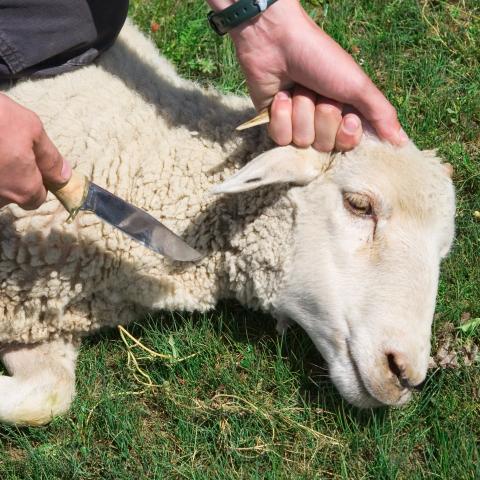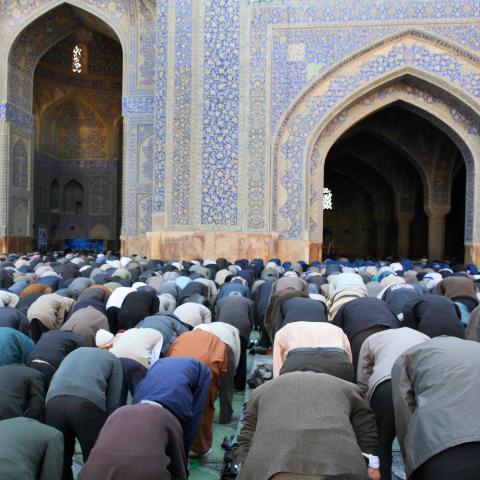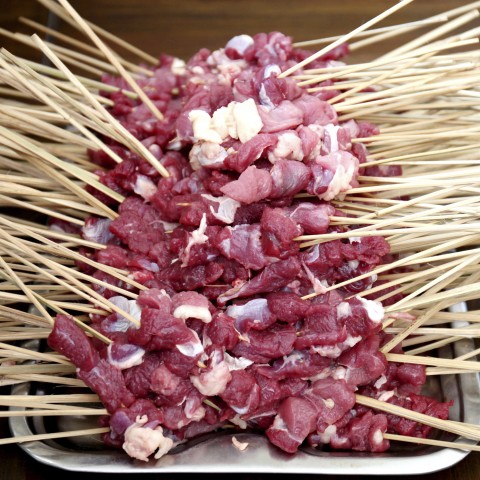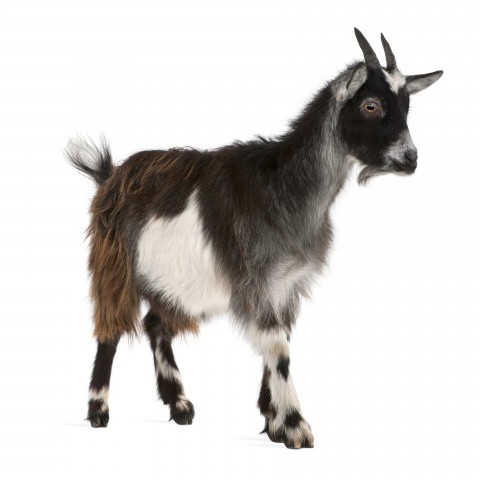Indonesians are known for their kind and patient nature, and this is even more pronounced during the Muslim holiday of Idul Adha (or Eid ul-Adha, Festival of Sacrifice) each year. Faith, charity, time with loved ones, and great food all come together on Idul Adha, one of the most important days on the Islamic calendar.
In this article, you’ll learn some useful information about Eid ul-Adha in Indonesia, including its origin and how people celebrate today.
Let’s get started!

1. What is Idul Adha?

Idul Adha, often called “The Feast of the Sacrifice” in English, is one of the most important Muslim holidays worldwide.
It originates from the story of Ibrahim, who was willing to sacrifice his son Ismael. According to the Quran, Ibrahim had asked Allah to give him a son, and Allah did so. But as Ismael grew older, Ibrahim began having recurring dreams of slaughtering his son and realized it was an order from Allah to sacrifice his son. Upon Ibrahim telling his son this, Ismael told his father to do as Allah willed. Ibrahim prepared his son for the sacrifice and was about to slaughter him, but was stopped by a voice. This voice told him that the “vision” had already been completed. Ibrahim was given a lamb to sacrifice in Ismael’s place, and Ismael was revealed to be a righteous prophet.
Today, the Muslim celebration of this holiday focuses on selflessness and serves as a reminder that Allah blesses the faithful. Idul Adha is also associated with the willingness to give up cherished possessions to glorify Allah.
- → See our vocabulary list on Religion to learn the names of different religions in Indonesian!
2. When is Idul Adha This Year?
The date of Idul Adha varies each year on the Gregorian calendar, as it takes place on the tenth day of Dhu al-Hijjah. The holiday then lasts for roughly three days.
Here’s a list of this holiday’s tentative start date for the next ten years.
| Year | Start Date |
|---|---|
| 2020 | July 31 |
| 2021 | July 20 |
| 2022 | July 10 |
| 2023 | June 29 |
| 2024 | June 17 |
| 2025 | June 7 |
| 2026 | May 27 |
| 2027 | May 17 |
| 2028 | May 6 |
| 2029 | April 24 |
Note that these dates may not be entirely accurate, and may vary. The date of Idul Adha is officially determined each year by professional moon-sighters, and the dates above are only expected estimates.
3. Idul Adha Observations & Traditions

On Idul Adha, Indonesian Muslims gather together at a masjid (“mosque”) to say Eid prayers and offer each other Eid ul-Adha greetings. In addition, people may grace their fellow Muslims with Eid ul-Adha wishes for their wellbeing. It’s common to wear nice, traditional clothing for this event.
In light of Ibrahim’s willingness to sacrifice his son—and Allah’s provision of a lamb to sacrifice in Ismael’s place—most Muslim families in Indonesia are expected to perform an animal penyembelihan (“slaughter”). It’s customary to divide the daging (“meat”) of the animal into three portions: one portion to give to the poor, one portion to take home to one’s family, and one portion to give to friends and other relatives.
It’s important to note that this sacrifice is not made as an atonement for sins, and it’s said that the blood and meat of the animal do not reach Allah at all. Rather, the sacrifice is more about charity in giving to those who otherwise wouldn’t have meat to enjoy on the holiday. This act of selflessness pleases Allah.
The Eid ul-Adha holiday in Indonesia is known for its lavish meat-based feasts, which are made from the meat of the sacrifice. Two favorite dishes are sate kambing (“mutton satay”) and gulai kambing (“mutton gulai”), though there are a variety of other menu options!
- → What’s Your Favorite Indonesian Food? Check out our vocabulary list to find out, and keep your eyes open for our upcoming article all about Indonesian Cuisine!
4. The Animals

In Jakarta, it’s not uncommon to find the streets dotted with animal pens as Idul Adha gets nearer! These pens contain goats and cows to be sold to families for slaughtering.
According to Islam, any animal that’s sacrificed must be both full-grown and in good condition, otherwise the sacrifice will be ignored.
- → We have a list of Animal Names in Indonesian you can look at to learn the name of your favorite animal!
5. Essential Vocabulary for Celebrating Idul Adha

Let’s review some of the Indonesian vocabulary words and phrases from this article!
- “Meat” — Daging [n.]
- “Mosque” — Masjid [n.]
- “Goat” — Kambing [n.]
- “Cow” — Sapi [n.]
- “Mutton” — Daging kambing [n.]
- “Kurban” — Kurban [n.] – a sacrifice to God made from a living thing
- “Eid prayers” — Salat Id [v.]
- “Abraham prophet” — Nabi Ibrahim
- “The poor” — Fakir Miskin
- “Mutton satay” — Sate kambing [n.]
- “Hajj’s Lebaran” — Lebaran haji [n.]
- “Mecca” — Mekkah
- “Slaughter” — Penyembelihan [n.]
- “Mutton gulai” — Gulai kambing [n.]
Remember that you can find each of these words with an audio pronunciation on our Indonesian Idul Adha vocabulary list!
Final Thoughts
The importance of Eid ul-Adha in Indonesia can’t be overstated. This is a time for fellow Muslims to get together for a sole purpose, help those in need, and reaffirm their faith.
What are your thoughts on Indonesia’s Idul Adha celebrations? Is there a similar holiday in your country or faith? Let us know in the comments!
To continue learning about Indonesian culture and the language, check out these free resources from the IndonesianPod101.com blog:
- How to Celebrate Batik Day in Indonesia
- Indonesian Remembrance Day: Hero’s Day in Indonesia
- Celebrating Pancasila Day in Indonesia
- Indonesian Etiquette: Table Manners in Indonesia and More!
- Top Indonesian Phrases for Travelers
Whatever your reasons for wanting to learn Indonesian or explore Indonesian culture, know that IndonesianPod101 has your back. Create your free lifetime account today, and take advantage of our numerous learning tools: themed vocabulary lists, spaced-repetition flashcards, video and audio lessons, and so much more!
Stay safe out there, and happy Indonesian learning.













